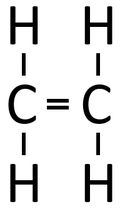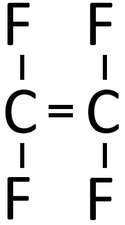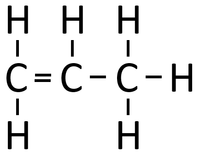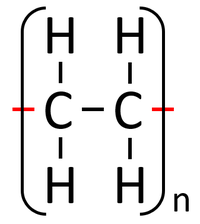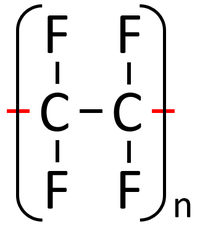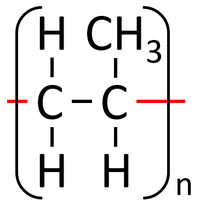Addition Polymerisation
Contents
Key Stage 4
Meaning
Addition polymerisation is a reaction in which the double bonds within monomers breaks to join the them together into a polymer.
About Addition Polymerisation
- In addition polymerisation the monomers join to form a polymer without any other products.
- Addition polymerisation happens between unsaturated alkene monomers.
Examples
| Polythene is a polymer made by reacting thousands of Ethene monomers. | PolyTetraFluoroEthene is a polymer made by reacting thousands of TetraFluoroEthene monomers. | PolyPropene is a polymer made by reacting thousands of Propene monomers. |
References
AQA
- Addition polymers, page 169, GCSE Chemistry; Third Edition, Oxford University Press, AQA'
- Addition polymers, pages 187-8, GCSE Chemistry, Hodder, AQA'
- Addition polymers, pages 236, 237, 245, GCSE Chemistry, CGP, AQA'
- Addition polymers, pages 80, 83, GCSE Chemistry; The Revision Guide, CGP, AQA'
- Addition reaction, alkenes, page 240-1, GCSE Chemistry; Student Book, Collins, AQA'
- Addition reactions, page 79, GCSE Chemistry; The Revision Guide, CGP, AQA'
- Addition reactions, pages 158-159, GCSE Chemistry; Third Edition, Oxford University Press, AQA'
- Addition reactions, pages 178-9, GCSE Chemistry, Hodder, AQA'
- Addition reactions, pages 233-235, GCSE Chemistry, CGP, AQA'
Edexcel
- Addition polymerisation, pages 184-185, GCSE Chemistry, Pearson, Edexcel
- Addition polymers, page 99, GCSE Chemistry; The Revision Guide, CGP, Edexcel
- Addition polymers, pages 288, 289, GCSE Chemistry, CGP, Edexcel
- Addition reactions, page 175, GCSE Chemistry, Pearson, Edexcel
- Addition reactions, page 286, GCSE Chemistry, CGP, Edexcel
- Addition reactions, page 98, GCSE Chemistry; The Revision Guide, CGP, Edexcel
